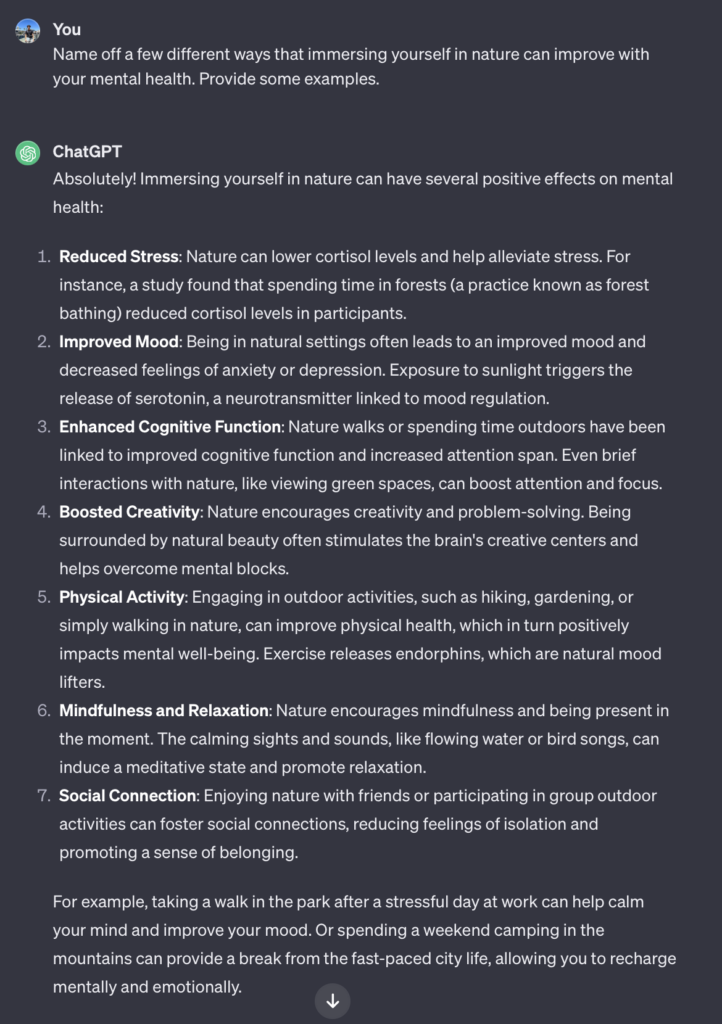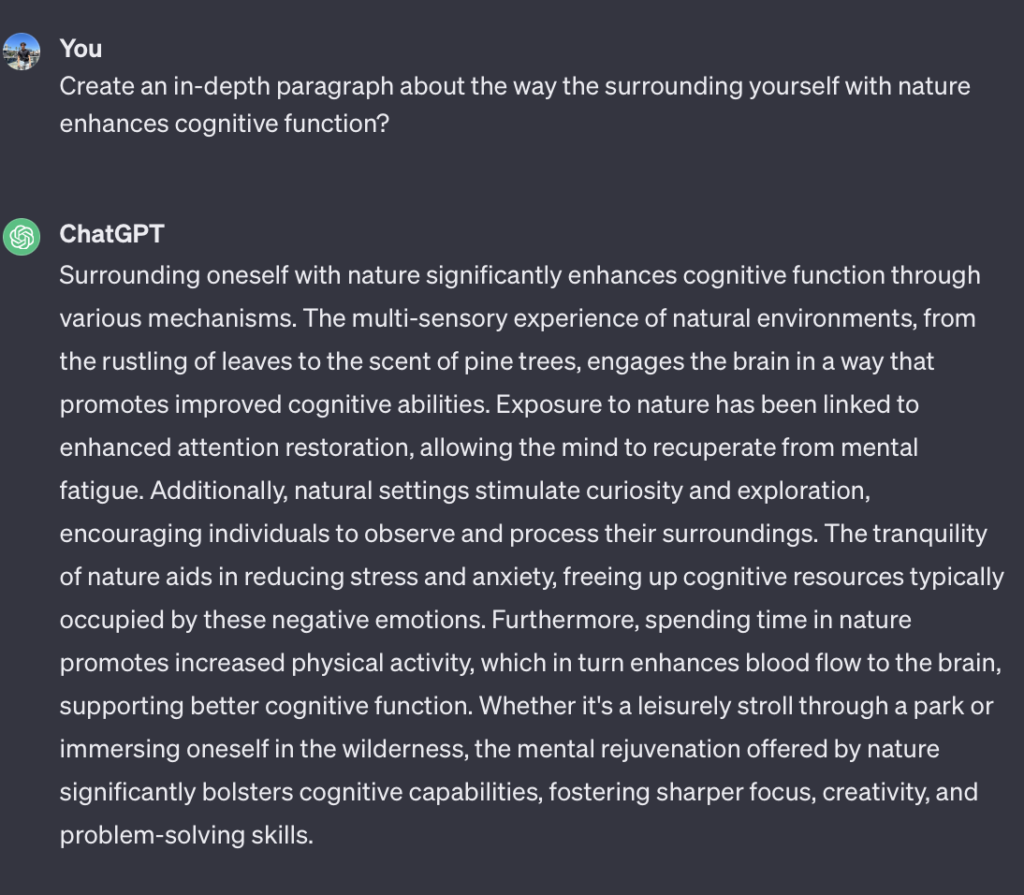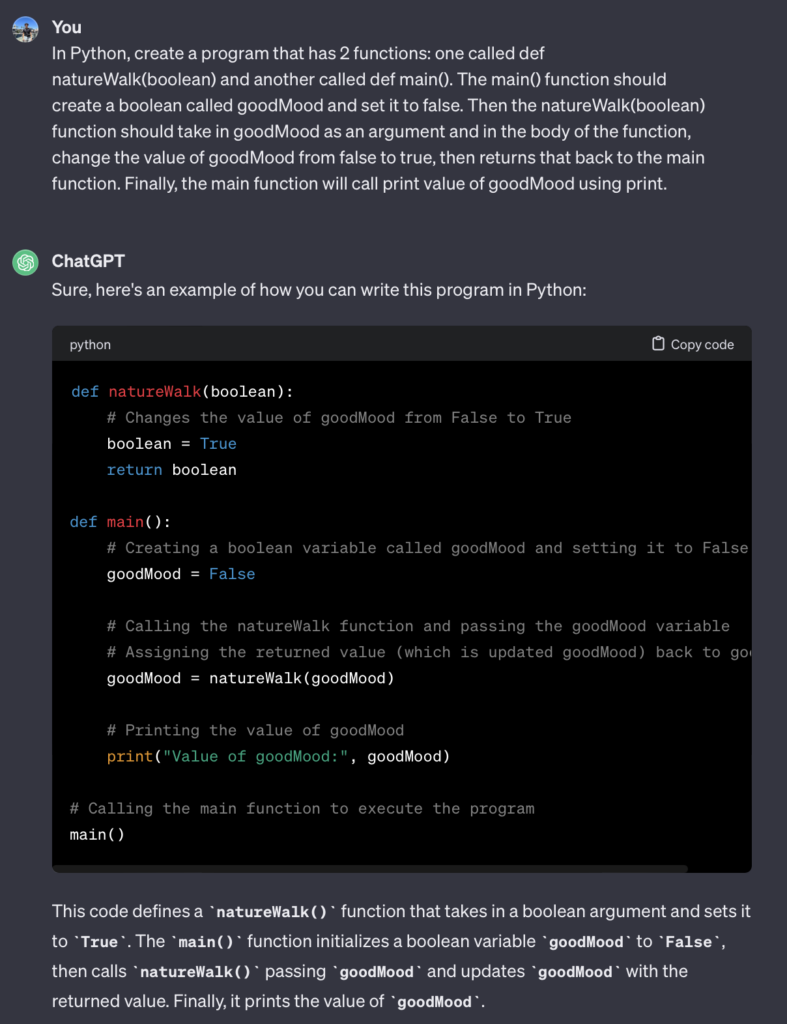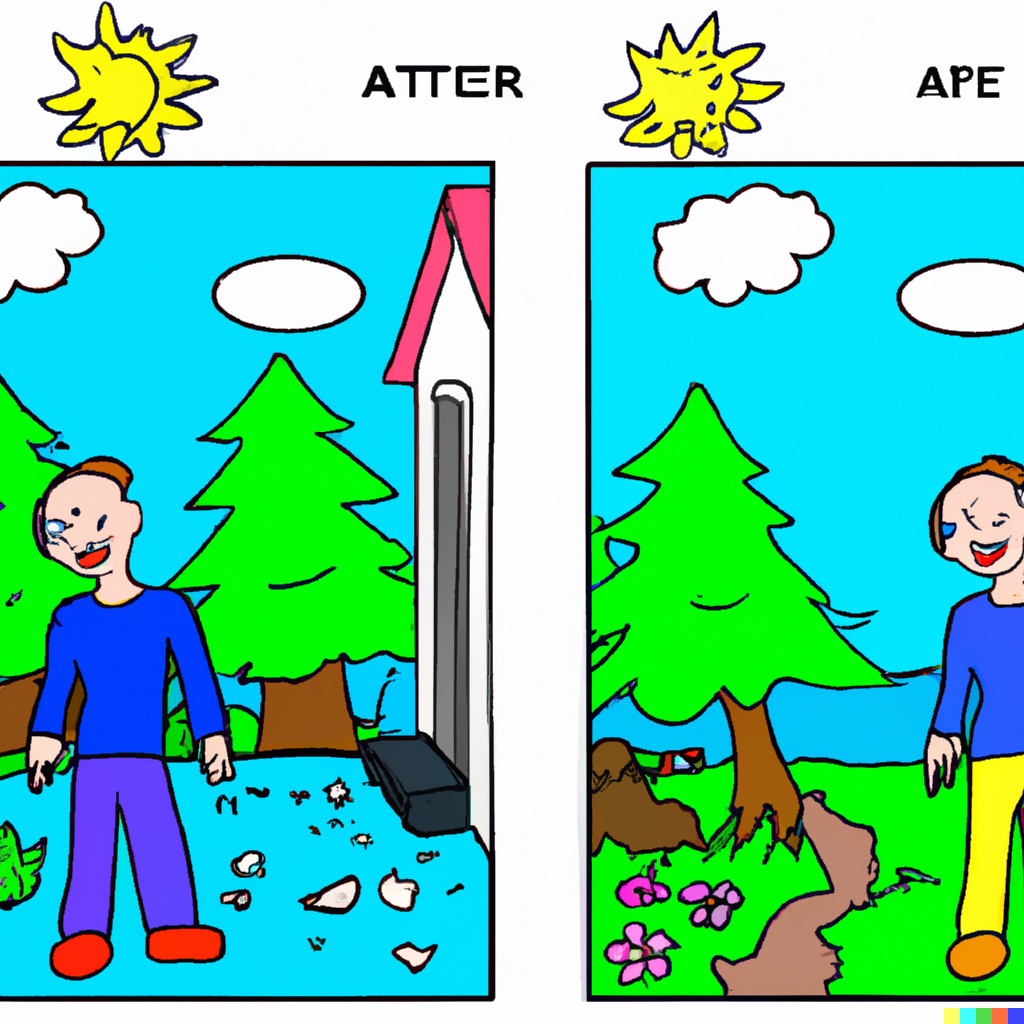In this module, I was given the opportunity to analyze generative AI tools learn more about how they operate. Being one of the biggest buzzwords in the world, the multifaceted use of AI undoubtedly raises questions about the future of multiple industries. As a computer science major, learning about the breakthroughs of AI is becoming imperative to stay competitive, knowledgeable, and employable in the field. The two tools that I opted for were ChatGPT 3.5 and DALL-E 2, both owned by OpenAI. Learning about the use and evolution of AI is something that I am personally passionate about and I aspire to have a career within that sphere.
ChatGPT
In ChatGPT, I used text prompts to generate information pertaining to the list of uses provided in the module description. These prompts aim to prospectively help me with creating my lesson in Module 4, The benefits of nature in mental health.

(OpenAI, 2023)
In my first prompt, I had the program brainstorm ideas to explain some ways that nature directly affects your mental health.

(OpenAI, 2023)
Following that, I had the program generate simple explanations for complex topics by allowing it to elaborate on the 3rd point above, enhanced cognitive function.

(OpenAI, 2023)
Finally, out of curiosity, I had the program write code and create a sample project in the Python programming language that simulates the theoretical “goodMood” value become true after running through the function natureWalk(). This program aims to satirically show that going to on a walk in nature improves your mood.
DALL-E
In DALL-E, I took a similar approach to my use of ChatGPT and used text prompts to generate images that visually express what immersing yourself in nature can do for your mental well-being.

(OpenAI, 2023)
Prompt used: “A cartoon of a person who looks happy and in a good mood while going for a nature walk.”

(OpenAI, 2023)
Prompt used: “A before-and-after cartoon, where the person goes from in their room in a sad mood, to in nature in the sunshine in a good mood.”
Reflection Questions
- Have you used AI applications before? If you have, what have you used them for?
The two free tools that I chose to examine, ChatGPT and DALL-E, are resources that I have utilized in the past out of curiousity or to finish schoolwork where appropriate. In my software engineering class, the use of GPT to get through labs and assignments is encouraged so long as you source the material. When tackling such tasks, using GPT can get you past roadblocks and give you mildly accurate solutions without scraping the internet. However, it is imperative that once a solution is obtained, a student should be able to interpret the answer and learn to derive it on their own. With regards to DALL-E, I have only experimented with it on my own because I am intrigued by a tool that can generate photos with a simple prompt. These tools from OpenAI have shown to be useful for me and I plan to make use of them in the future as they evolve.
- What ethical concerns do you have (or not have) about the use of some of these tools? (signatures from artists without their consent)
An ethical concern that I have surrounding AI is copyright infringement and proper credit. As stated in the module description, the lines clarifying who owns which types of content have been blurred and certain court cases can be a toss-up. This applies for generated text, images, and things of the like. Since these models effectively scrape the internet for copious amounts of data to become “smarter”, it raises the question about what happens when copyrighted content is emulated by AI very closely, if not exactly. For instance, there exist companies who create AI models that generate portrait-like images of you if you input a few photos of your face. In the generated images, you may sometimes be able to see the signature of an artist responsible for creating the background or other aspect of the photo that the AI scraped from the web, where presumably the original artist was not accredited with their part of the creation. Some examples of these companies are LensaAI and AnimalAI.
Moreover, information privacy breaching is another concern that I have with these tools. As AI grows in popularity and accessibility, it will become much easier for bad actors to exploit AI to generate sensitive data and/or personal information. For example, the popular use of AI to simulate human voices in what is called a “deepfake” is making it extremely difficult to distinguish real from artificial which open the doors for scams, crimes, and other malicious acts.
- Where do you think these tools will be in their evolution in 2-3 years’ time?
Considering the exponential leaps in the development of these tools and their capabilities over the last year which was arguably spearheaded with the release of ChatGPT, I think that AI tools will be farther in development and implementation that any of us can roughly predict. I am an advocate that AI on roughly every level can be used in tandem with human intelligence to solve problems and accomplish tasks. However, as mentioned before, I see the works of AI seeping into every industry that sees it fit, firstly looking to augment tasks that are strongly automated. While I don’t have insight on how AI will affect each industry individually, I am confident that the way that AI learns to use big data will be key to how that industry changes, however that may be. From automated healthcare diagnostics to automated voice actors in your favorite cartoons, I think AI is moving closer to widespread adaptation faster than we realize.
References
- OpenAI. (2023, Nov. 20). [ChatGPT response to a prompt about examples improving mental health by immersing yourself in nature]. https://chat.openai.com/
- OpenAI. (2023, Nov. 20). [ChatGPT response to a prompt about an insightful paragraph about nature enhancing cognitive function]. https://chat.openai.com/
- OpenAI. (2023, Nov. 20). [ChatGPT response to a prompt about creating a Python script to simulate setting a goodMood value to true by going on a Nature Walk]. https://chat.openai.com/
- OpenAI. (2023, Nov. 20). [DALL-E response to a prompt about a cartoon of a person who looks happy on a nature walk]. https://labs.openai.com
- OpenAI. (2023, Nov. 20). [DALL-E response to a prompt about a cartoon about a person going from a bad mood to a good mood through nature]. https://labs.openai.com